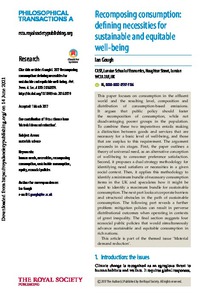Recomposing consumption: defining necessities for sustainable and equitable well-being

Philosophical Transactions of the Royal Society A
2017
375
2095
1-18
basic needs ; consumption ; well being ; government policy ; sustainable development
Income distribution
https://doi.org/10.1098/rsta.2016.0379
English
Bibliogr.
"This paper focuses on consumption in the affluent world and the resulting level, composition and distribution of consumption-based emissions. It argues that public policy should foster the recomposition of consumption, while not disadvantaging poorer groups in the population. To combine these two imperatives entails making a distinction between goods and services that are necessary for a basic level of well-being, and those that are surplus to this requirement. The argument proceeds in six stages. First, the paper outlines a theory of universal need, as an alternative conception of well-being to consumer preference satisfaction. Second, it proposes a dual strategy methodology for identifying need satisfiers or necessities in a given social context. Then, it applies this methodology to identify a minimum bundle of necessary consumption items in the UK and speculates how it might be used to identify a maximum bundle for sustainable consumption. The next part looks at corporate barriers and structural obstacles in the path of sustainable consumption. The following part reveals a further problem: mitigation policies can result in perverse distributional outcomes when operating in contexts of great inequality. The final section suggests four ecosocial public policies that would simultaneously advance sustainable and equitable consumption in rich nations.
This article is part of the themed issue ‘Material demand reduction'."
Digital
The ETUI is co-funded by the European Union. Views and opinions expressed are however those of the author(s) only and do not necessarily reflect those of the European Union or the ETUI.